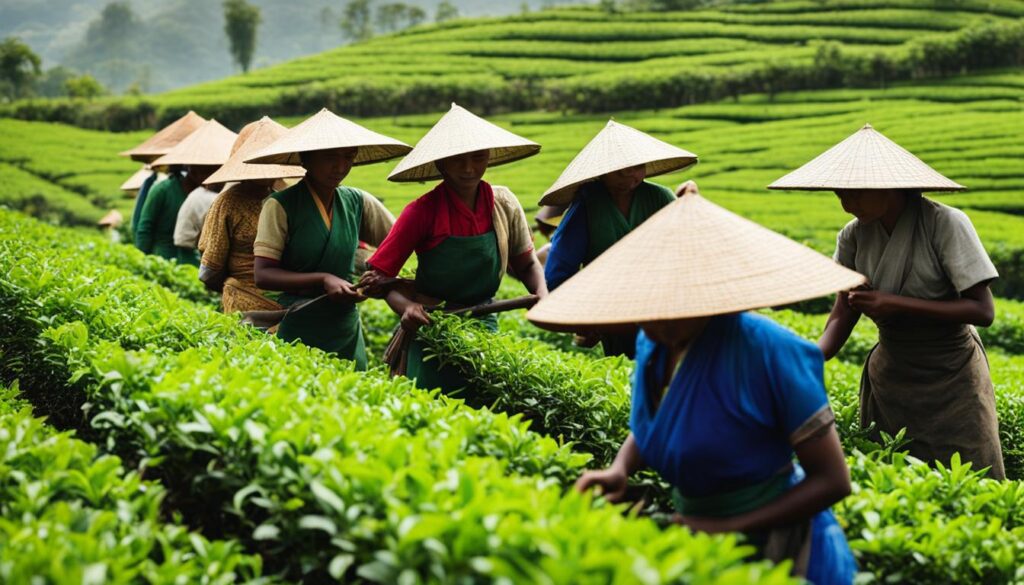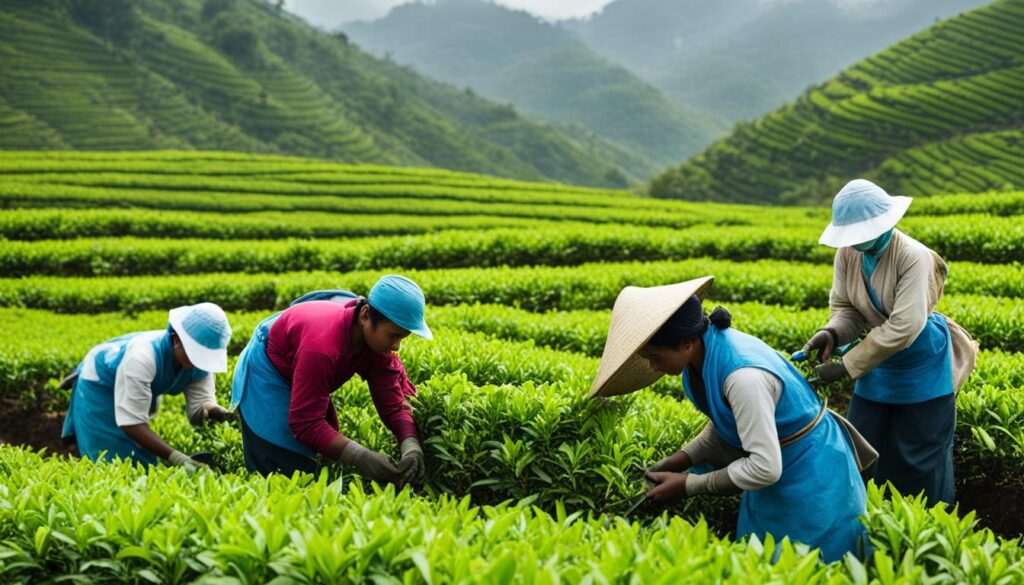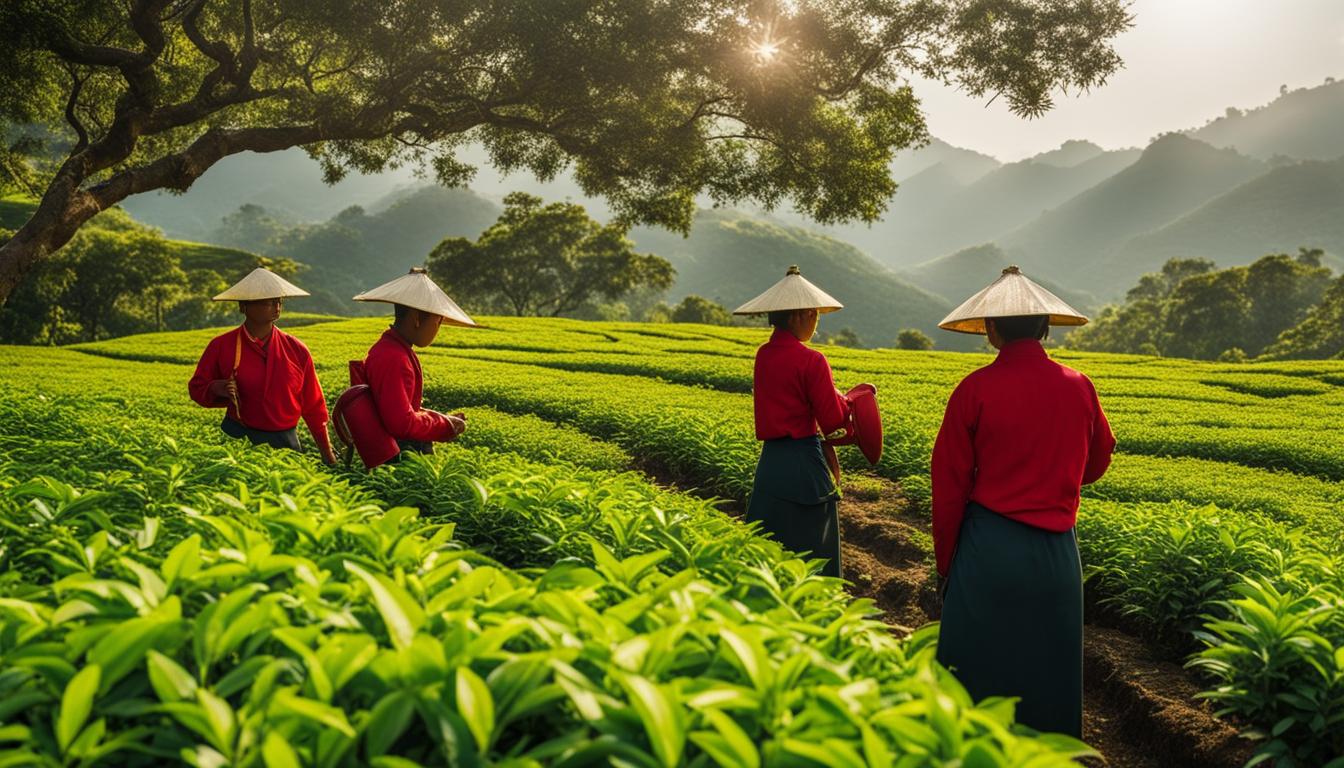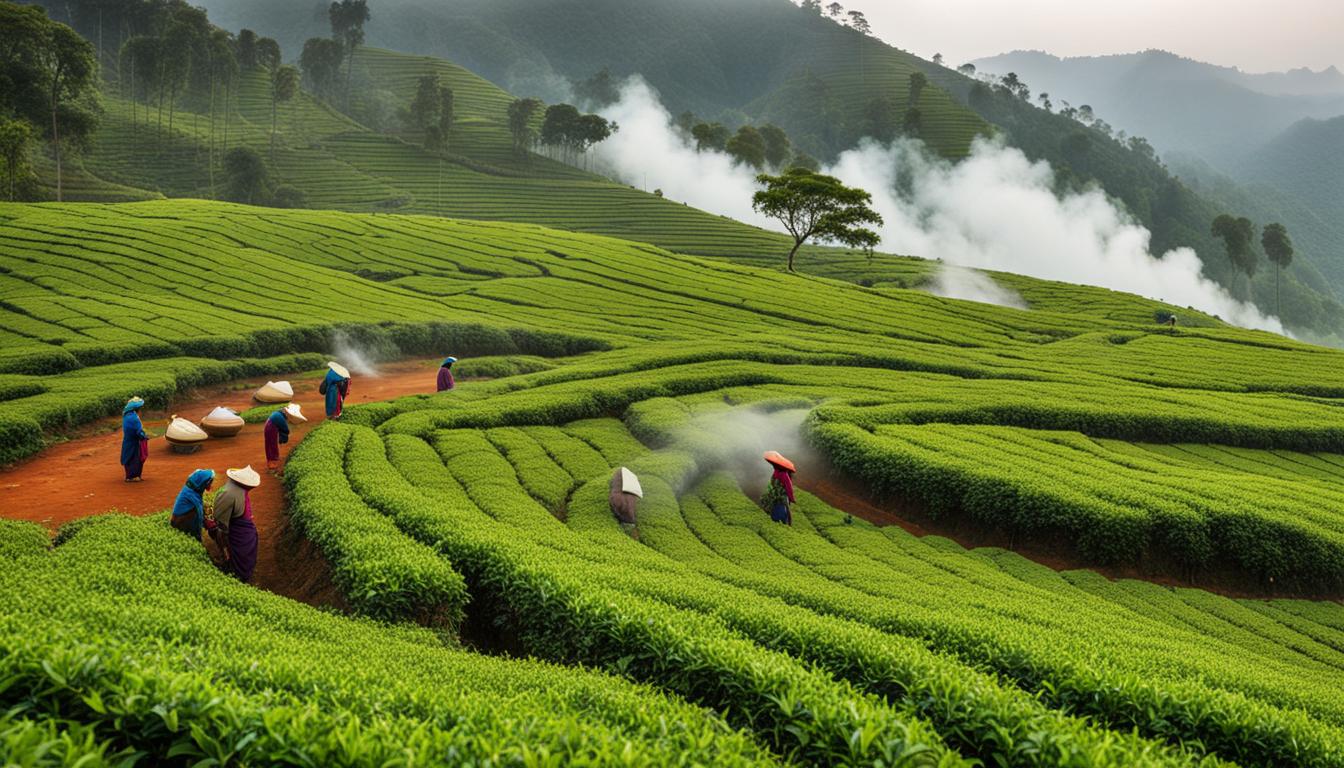Welcome to our article on certification standards in tea cultivation. In order to ensure the production of exceptional tea, it is essential for tea farmers to adhere to specific quality criteria. These standards cover various aspects of tea farming, including sustainable practices, worker welfare, environmental impact, and product quality.
At [Our Company], we understand the importance of certification standards in tea cultivation. By achieving and upholding these standards, tea farmers can guarantee the production of high-quality tea that meets and exceeds the expectations of consumers.
Key Takeaways:
- Tea cultivation certification standards ensure tea produced meets specific quality criteria.
- Certification covers sustainable farming practices, worker welfare, environmental impact, and product quality.
- Adherence to certification standards guarantees the production of high-quality tea.
- Certification standards contribute to a more sustainable and ethical tea industry.
- By upholding these standards, tea farms can improve the quality of their products and contribute to a more responsible industry.
Standards for Organic Tea Certification
When it comes to tea cultivation, organic certification standards play a vital role in promoting sustainable farming practices and ensuring the environmental integrity of tea production. These standards are designed to safeguard the planet, protect consumer health, and support ethical tea farming. By adhering to these standards, tea farmers can provide consumers with tea that is free from harmful chemicals and produced in an environmentally responsible manner.
Organic tea certification standards prohibit the use of synthetic pesticides, fertilizers, and genetically modified organisms (GMOs). Instead, organic tea farms follow strict guidelines for soil management, water conservation, and biodiversity preservation. This commitment to eco-friendly practices not only helps in safeguarding the environment but also protects the health of tea farmers, workers, and consumers.
The adherence to organic certification standards is verified through a comprehensive audit process. Organic tea farms undergo regular inspections and assessments to ensure compliance with the standards set by recognized certifying bodies. This includes monitoring farming methods, record-keeping, and supply chain management to ensure transparency and traceability.
Benefits of Organic Tea Certification:
- Promotes sustainable agricultural practices
- Protects the environment and biodiversity
- Ensures the production of tea free from harmful chemicals
- Supports the health and well-being of tea farmers, workers, and consumers
Organic tea certification is an important benchmark for farmers and consumers alike. It not only guarantees the quality and authenticity of organic tea but also supports the growth of a sustainable and responsible tea industry. By choosing organic-certified teas, consumers can enjoy their favorite beverage with the added assurance that it has been produced with care for both people and the planet.
Tea Farm Audit and Certification Process
In order to ensure compliance with specific standards and regulations, tea farms undergo a comprehensive audit and certification process. This process involves a variety of measures to assess the farm’s adherence to guidelines and requirements set forth by various sustainability certifications and industry standards. The tea farm audit and certification process play a vital role in assuring consumers that the tea they purchase is ethically produced and supports sustainable farming practices.
During the tea farm audit process, on-site inspections are conducted to assess the farm’s adherence to environmental, social, and quality standards. Inspectors evaluate various aspects such as waste management, water conservation, soil health, worker welfare, and adherence to organic or fair trade practices. Documentation reviews and interviews with farmers and workers are also conducted to gather comprehensive data on the farm’s practices and policies.
Tea farms can obtain various sustainability certifications, such as Fair Trade, Rainforest Alliance, and UTZ, which demonstrate their commitment to social and environmental responsibility. Each certification has its own specific criteria and requirements, and farms must meet those standards to be certified. These certifications provide reassurance to consumers that the tea they purchase is produced in a manner that aligns with their values and contributes to a more sustainable tea industry.
| Certification | Focus Area | Description |
|---|---|---|
| Fair Trade | Social Responsibility | Ensures fair wages, safe working conditions, and community development projects for tea farm workers. |
| Rainforest Alliance | Environmental Conservation | Promotes biodiversity preservation, sustainable farming practices, and ecosystem protection. |
| UTZ | Social and Environmental Responsibility | Focuses on sustainable farming practices, worker welfare, and responsible use of resources. |
By undergoing the rigorous tea farm audit and certification process and obtaining sustainability certifications, tea farms demonstrate their commitment to ethical and sustainable practices. These certifications not only benefit farmers and workers by ensuring fair treatment and improved livelihoods but also contribute to the overall health of the environment and the industry as a whole. As consumers increasingly prioritize ethical and sustainable choices, the tea farm audit and certification process becomes crucial in building trust and fostering a more responsible tea industry.
Tea Cultivation Quality Standards
When it comes to tea cultivation, quality standards play a crucial role in ensuring that the tea produced meets specific criteria for taste, aroma, appearance, and overall sensory experience. These standards are developed to maintain consistency and meet consumer expectations. Let’s take a closer look at some of the key quality standards in tea cultivation:
Globally Recognized Standards:
There are various globally recognized standards that govern tea cultivation and provide guidelines for tea farmers to improve their practices and enhance quality control measures. These standards cover aspects such as farming techniques, processing methods, and product quality. By adhering to these global standards, tea farms can ensure that their tea meets international quality requirements.
Type-Specific Standards:
Tea quality standards may also vary depending on the type of tea being produced, such as black, green, or oolong. These standards define specific parameters for each type, including leaf size, color, fragrance, and infusion characteristics. By adhering to these type-specific standards, tea farmers can consistently produce teas that meet the distinct flavor profiles and quality expectations of each type.
| Tea Type | Leaf Size | Color | Fragrance | Infusion Characteristics |
|---|---|---|---|---|
| Black Tea | Small and tightly rolled | Dark brown to black | Malting aroma | Strong and robust flavor |
| Green Tea | Large and flat | Bright green | Grassy or vegetal aroma | Light and refreshing flavor |
| Oolong Tea | Semi-ball rolled or twisted | Various shades of green to brown | Floral or fruity aroma | Moderate to full-bodied flavor |
Consistency and Consumer Expectations:
By adhering to tea cultivation quality standards, tea farmers can produce high-quality teas that consistently meet consumer expectations in terms of flavor, aroma, and overall quality. These standards provide a benchmark for excellence in tea production and help to maintain quality across different batches and harvest seasons.
Tea cultivation quality standards are vital in ensuring that tea farmers produce teas that not only taste great but also meet the expectations of tea enthusiasts worldwide. By adhering to these standards, tea farms can continue to provide consumers with teas that are of the highest quality and deliver a delightful sensory experience.
Tea Farm Worker Welfare Certification
Ensuring the well-being and safety of workers involved in tea cultivation is a paramount concern in the tea industry. Tea farms can obtain tea farm worker welfare certification to demonstrate their commitment to ethical labor practices and contribute to the welfare of tea workers. These certifications require tea farms to provide fair wages, safe working conditions, and access to healthcare and education for workers and their families.
Worker welfare certifications also emphasize gender equality and prohibit child labor, creating a supportive and inclusive work environment. By achieving these certifications, tea farms not only protect the rights and well-being of their workers, but they also gain the trust and loyalty of consumers who value ethical sourcing and fair labor practices.
To maintain tea farm worker welfare certification, tea farms undergo regular audits and inspections to ensure compliance with health and safety standards. These audits cover various aspects of worker welfare, such as working hours, hygiene practices, occupational health, and safety training. By meeting and exceeding these standards, tea farms can create a safe and healthy working environment, which ultimately contributes to the production of high-quality tea.
The Benefits of Tea Farm Worker Welfare Certification:
- Ensures fair wages and labor practices
- Promotes safe working conditions
- Provides access to healthcare and education
- Promotes gender equality and prohibits child labor
- Builds trust and loyalty with consumers
- Supports the overall welfare of tea workers
Tea farm worker welfare certification is an important step towards creating a more sustainable and ethical tea industry. By prioritizing the well-being of workers, tea farms can contribute to the social and economic development of tea-producing regions while producing tea that meets the highest quality standards.

Global Tea Cultivation Standards
When it comes to tea cultivation, global standards play a vital role in ensuring consistency, quality, and sustainability across different regions. These standards encompass various aspects of tea production, including farming techniques, processing methods, product quality, and environmental impact. By adhering to these global standards, tea farms can improve their cultivation practices, enhance quality control measures, and contribute to a more standardized and responsible tea industry.
One of the key areas covered by global tea cultivation standards is farming techniques. These standards provide guidelines for tea farmers to cultivate tea plants using sustainable methods that minimize environmental impact. They emphasize the importance of soil management, water conservation, and biodiversity preservation. By following these standards, tea farms can protect natural resources, reduce pollution, and support the long-term sustainability of the tea industry.
Another aspect addressed by global standards is product quality. These standards define the parameters for taste, aroma, appearance, and overall sensory experience of different types of tea. They specify criteria such as leaf size, color, fragrance, and infusion characteristics, ensuring that consumers receive consistently high-quality tea. By meeting these quality standards, tea farmers can maintain consumer satisfaction and uphold the reputation of their tea brands in the global market.
| Benefits of Global Tea Cultivation Standards | Explanation |
|---|---|
| Standardized Practices | Global standards help tea farms adopt standardized cultivation practices, ensuring consistency and efficiency in tea production. |
| Improved Quality Control | By following global quality standards, tea farms can enhance their quality control measures and produce tea that meets consumer expectations. |
| Environmental Sustainability | Global standards promote sustainable farming practices, minimizing the environmental impact of tea cultivation and protecting natural resources. |
| Market Access | By meeting global standards, tea farms can gain access to international markets and attract a wider range of consumers. |
Global tea cultivation standards ensure that tea farms worldwide are working towards a common goal of producing high-quality, sustainable, and ethically grown tea. These standards not only benefit tea farmers by providing guidance and best practices, but they also benefit consumers by ensuring that they can enjoy a cup of tea that is both delicious and produced with care for the environment and the well-being of tea workers. By embracing these standards, the global tea industry can thrive and continue to bring joy to tea lovers around the world.
Sources:
- TeaUSA
- Tea Certification Organization

Fair Trade Certification for Tea Farms
Fair trade certification for tea farms is a testament to our commitment to ethical and sustainable practices within the tea industry. By obtaining this certification, we ensure that tea farmers receive fair prices for their products and are treated ethically throughout the supply chain. Fair trade certifications require us to meet specific criteria, including fair wages, safe working conditions, and community development projects.
Being fair trade certified not only empowers small-scale tea farmers but also promotes sustainable livelihoods and contributes to a more equitable tea industry. It allows us to make a positive impact on the lives of tea farmers and their communities, ensuring that their hard work is rewarded fairly. With fair trade certification, we can provide consumers with tea that not only tastes exceptional but is also produced with integrity and social responsibility.
By supporting fair trade certified tea farms, consumers can play an active role in creating a more equitable and sustainable world. Every purchase of fair trade tea directly supports the livelihoods of tea farmers and helps to foster a more sustainable supply chain. Together, we can make a difference and enjoy the rich flavors of tea while being confident in the ethical and fair practices behind its production.
Benefits of Fair Trade Certification for Tea Farms
- Fair prices for tea farmers
- Ensures ethical treatment of workers
- Promotes sustainable livelihoods
- Supports community development projects
- Contributes to a more equitable tea industry
“Fair trade is not just a certification; it’s a commitment to fairness, sustainability, and empowerment.”– Fair Trade International
It is important for us as consumers to be conscious of the impact of our choices. By opting for fair trade certified teas, we can enjoy our favorite beverage while supporting tea farmers and ensuring their well-being. Together, we can create a more sustainable and equitable tea industry, one cup at a time.
Conclusion
Throughout this article, we have delved into the world of tea cultivation certification standards and their significance in ensuring excellence in the industry. From organic certifications to worker welfare certifications, these standards play a critical role in upholding quality, sustainability, and ethical practices.
By adhering to these standards, tea farms can produce high-quality tea that meets the expectations of consumers. Whether it’s the stringent guidelines for organic tea cultivation or the emphasis on worker welfare and fair trade, these certifications provide reassurance to tea lovers that their favorite beverage is produced responsibly.
Moreover, sustainability certifications and health and safety standards contribute to a more responsible and environmentally conscious tea industry. By implementing these certifications, tea farms not only improve the quality of their products but also contribute to a more equitable and sustainable future for tea farmers and the environment.
Ultimately, certification standards act as a guiding compass for the tea industry, promoting best practices, and ensuring the well-being of tea farmers and workers. As consumers, we can support this movement by choosing teas that bear these certifications, thereby making a tangible difference in the tea industry’s sustainability and the lives of those who make our beloved cup of tea possible.
FAQ
What are tea cultivation certification standards?
Tea cultivation certification standards ensure that tea produced meets specific quality criteria, covering aspects such as sustainable farming practices, worker welfare, environmental impact, and product quality.
What do organic tea certification standards focus on?
Organic tea certification standards promote sustainable farming practices and prohibit the use of synthetic pesticides, fertilizers, and genetically modified organisms (GMOs).
How are tea farms audited and certified?
Tea farm audit and certification involves on-site inspections, documentation reviews, and interviews with farmers and workers to ensure compliance with specific standards and regulations.
What sustainability certifications can tea farms obtain?
Tea farms can obtain certifications such as Fair Trade, Rainforest Alliance, and UTZ, demonstrating their commitment to social and environmental responsibility.
What do quality standards in tea cultivation cover?
Quality standards include parameters such as taste, aroma, appearance, and overall sensory experience to ensure consistent tea quality and flavor.
What does tea farm worker welfare certification focus on?
Tea farm worker welfare certification ensures fair wages, safe working conditions, access to healthcare and education, gender equality, and prohibits child labor.
What do global tea cultivation standards aim to achieve?
Global tea cultivation standards aim to harmonize practices, improve quality control, minimize environmental impact, and enhance cultivation techniques worldwide.
How does fair trade certification benefit tea farms?
Fair trade certification ensures tea farmers receive fair prices, promotes ethical labor practices, and contributes to community development projects.
How do certification standards contribute to the tea industry?
Certification standards improve the quality, sustainability, and ethical practices of tea cultivation, creating a more responsible and sustainable tea industry.





